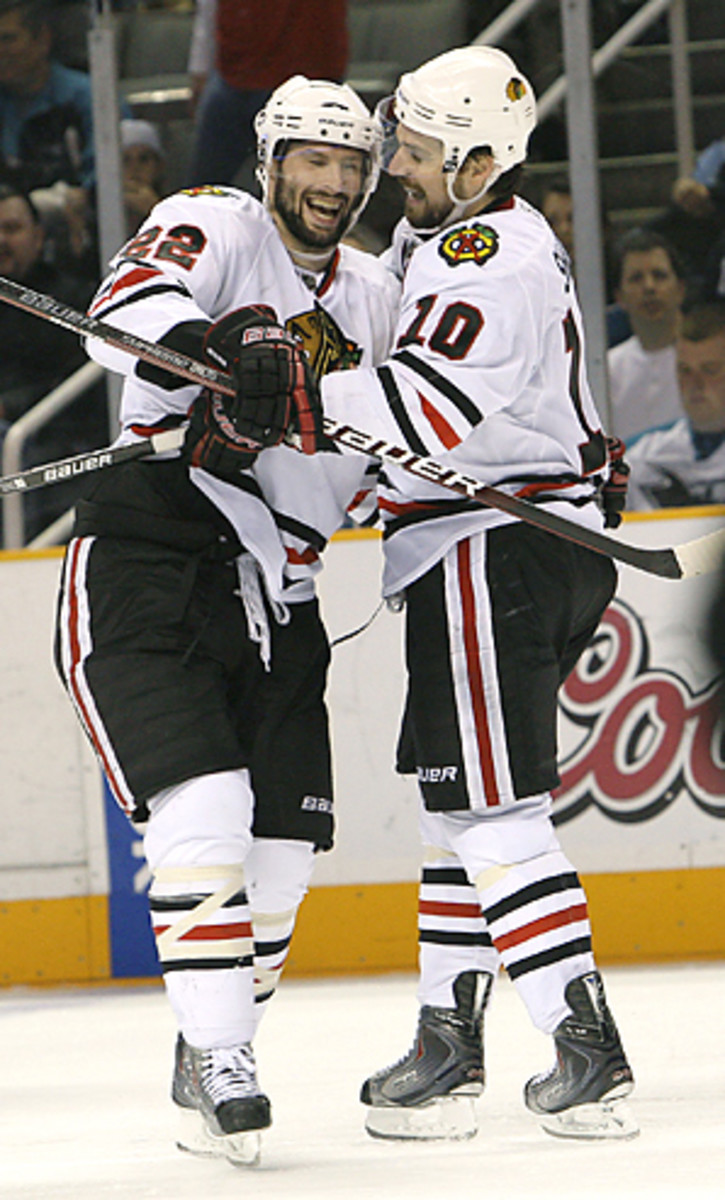
Blackhawks owe road success to big scorers, versatile checking lines
In some series, it doesn't much matter. Sometimes, both coaches like their top lines facing off against each other -- power on power. But other times, one coach has a different idea.
As it goes, Blackhawks coach Joel Quenneville knows which players he wants against the Sharks' top line; and even though he doesn't have the luxury of the last change here in San Jose, he's been able to get his checking line out there against the Sharks' top scorers -- Joe Thornton, Patrick Marleau and Dany Heatley -- with some success.
"When you're on the bench and there's a lot of line-matching going on, for as much as we'd like to have a group of players out against a certain line, they're very good at changing," Sharks coach Todd McLellan said Tuesday morning. "They obviously prefer [Dave] Bolland against Jumbo [Thornton]."
And why wouldn't the Blackhawks? Bolland and linemates Kris Versteeg and Andrew Ladd have done particularly well. Aggressive on the forecheck, the Blackhawks' third line forced Thornton, Heatley and Marleau to play in their own zone for more time than they'd prefer and limited their quality chances on goalie Antti Niemi, who finished the game with 25 saves.
"Bolland's line happens to be one of the best checking lines in the league right now, and [our top line] has to find a way to get through it," McLellan said after the game.
Over the course of the postseason, the Hawks' checking line, and especially the 23-year-old center Bolland, have been an effective go-to option for Quenneville, no matter the opposition's big guns. Bolland helped put a muzzle on the Sedin twins in Vancouver during the second round, limiting the league's leading scorer Daniel Sedin to two goals and six points. Brother Henrik didn't fare much better, with a goal and three assists in six games. In Tuesday's game, it seemed that Bolland got the better of Thornton.
About eight minutes into the third period, with the Sharks down 3-1, Jumbo Joe, known for his jovial demeanor and laid-back style, showed a sign of frustration. On the draw against Bolland, and even before the puck dropped, Thornton slashed his counterpart on the wrist -- "a love tap," Bolland said. He was sent to the box for two minutes. The act caught Bolland by surprise.
"When you take a draw, you go for a puck, not a wrist, right?" Bolland said.
But his line isn't merely Chicago's shutdown players; in fact, they opened the scoring nearly 13 minutes into the game when Ladd played pick-a-corner with Sharks goalie Evgeni Nabokov. The Blackhawks winger skated down the left side with Sharks defenseman Niclas Wallin in front of him and acting as a partial screen. From just inside the blueline, Ladd went high glove side on the goalie, beating him cleanly.
"Yeah, I knew Laddy had a shot like that," Versteeg said. Then he quipped, "He never uses it, especially when I give him the puck."
McLellan lamented, "[Their first goal] took some of the energy out of the building. Took a lot of energy out of our team. Took us a while to get our heads up again, if you will, for lack of a better term."
Before the game, Sharks winger Devin Setoguchi talked about owning the middle of the ice, and how important that area is. "If you're on the outside as an offensive player, a lot of times, you're not going to get the scoring chances," he said. "You're not going to be able to get to the front of the net. And that's when you become a perimeter player. You want to be inside, get second and third opportunities."
Setoguchi proved to be right. The Blackhawks were quite successful getting in front and owning the middle of the ice. Chicago's three other goals traveled through traffic and ended up hitting bodies and sticks in front. Dustin Byfuglien, Jonathan Toews and Troy Brouwer all scored by parking their bodies in those dirty areas and staying strong while shots from the outside maneuvered their way in. Byfuglien, a 260-pound block of a man, has his way in those places.
"I thought we could have done a much better job controlling his stick," McLellan said. "You're not going to move that man. He's that big, that strong, he establishes himself. Better be able to control his stick. We failed to do that. Obviously, made a huge impact on the game."
As the Sharks move to the United Center for Game 3 on Friday down 2-0, it stands to reason that strategy won't be any easier to execute. They will need to find a way to get their big guns into that area, and Chicago's big guns out.




